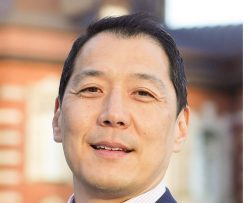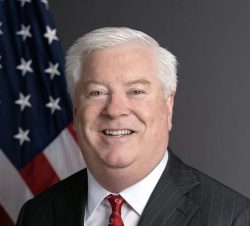14:58 JST, February 17, 2022
Just as economists and demographers worry about Japan’s “2025 problem,” when more than 30% of Japan’s population will be 75 or older, administrators in U.S. higher education have been bracing for the coming of the year 2025 for their own reasons. That year, the number of high school graduates in the United States, which has been on a slow increase since the mid-1990s, will reach its peak and begin to decline, which signals financial catastrophe for tuition-dependent private institutions like my own university.
But nobody expected the COVID pandemic, which caused a drastic change in the college recruitment landscape a few years before the anticipated drop.
Last fall, University of California and California State University campuses received record-setting numbers of applications, which crashed their online application system, while applications to smaller private institutions sharply declined.
My university is a good example of the latter. In pre-COVID years, we had somewhere around 2,800 undergraduate students; this year only 2,300. They are pessimistic about the next few years as well. As the larger cohorts of current juniors and seniors (who started college before COVID) graduate and are replaced by smaller classes, we anticipate that the overall student body will decline to 2,000 — a nearly 30% drop in comparison to pre-COVID years.
The pandemic didn’t change the number of high school graduates in the past year; instead, it pushed them away from small private schools in favor of big state universities. How? I think there are three important factors.
In recent years, more and more students are working 30 hours or more per week to meet their financial needs while in college. Pandemic-induced job and income losses further increased the financial burden on students.
Under these circumstances, the accessibility of a college has become a much bigger factor in their decision-making. A sprawling campus away from the city used to be an ideal backdrop for a college experience; now, it means a longer commuting time two, even three hours on the freeway four to five days a week — on top of everything else. In the first year of the pandemic, students also became familiar with online learning. Reluctant at first, many got used to learning online and realized that they did fine for the most part. Even the ones who hated online learning recognized that there were certain advantages to being able to “go to class” from their bedroom, their backyard, or even a parked car. When you are working long hours, easy and flexible access is golden.
And most importantly, the uncertainty of the pandemic has also made students more worried than ever about their future. They are worried that they will never be able to find a good enough job, pay their educational loans and support themselves. Reining in their debt and increasing their chances for a secure future have become the driving concerns in their decision-making, along with the perception of “value,” or what you can get out of your tuition dollars. Why pay higher tuition if all it buys you is a prettier campus or a better choice of clubs and activities, which don’t matter anyway if you are commuting from home?
These are the reasons why students are shunning so-called liberal arts colleges and universities, in favor of state-run institutions with lower tuition, easer access and more professionally oriented programs.
From the point of view of the faculty in small liberal-arts institutions, this shift is hard to swallow — not only for its financial implications, but more importantly, for philosophical ones. They pride themselves on helping students develop a broad-based intellectual foundation before they enter a specific professional path, and when they hear that students today expect their college education to land them a good job, they often respond with panic and anger. That’s not what college is all about — becoming a well-rounded person has to be at least as important as being a successful professional.
Last semester, I decided to ask my senior sociology/anthropology majors to propose an “ideal curriculum” for their major. They talked among themselves, studied course catalogs from other universities and colleges, interviewed other sociology/anthropology majors, peers from other departments, and even those in other universities.
If their proposed models were not necessarily realistic, they sent me one important message: They wanted their college education to be relevant in the real world. Sometimes, they expressed this in terms of finding jobs after graduation, but more often, they were looking for a meaningful connection between what they were learning in the classroom and what they were seeing and experiencing in their lives outside of it.
If we are to raise the value of the liberal arts brand of college education in the eyes of our current and future students, we need to take the advice of my senior students seriously and thoughtfully. We have a generation of young people who are worried about their future but are also eager to make a difference and help others. They want a decent life for themselves and their loved ones for sure, but they also want the same for others. If we give them tools to channel their anxiety and help them find a path to actualize the kind of society they hope for, we are not only saving our institution, but also making an important contribution to our society’s future — which is at the core of our educational mission after all.
Top Articles in Editorial & Columns
-

Riku-Ryu Pair Wins Gold Medal: Their Strong Bond Leads to Major Comeback Victory
-

40 Million Foreign Visitors to Japan: Urgent Measures Should Be Implemented to Tackle Overtourism
-

China Provoked Takaichi into Risky Move of Dissolving House of Representatives, But It’s a Gamble She Just Might Win
-

University of Tokyo Professor Arrested: Serious Lack of Ethical Sense, Failure of Institutional Governance
-

Policy Measures on Foreign Nationals: How Should Stricter Regulations and Coexistence Be Balanced?
JN ACCESS RANKING
-

Japan PM Takaichi’s Cabinet Resigns en Masse
-

Japan Institute to Use Domestic Commercial Optical Lattice Clock to Set Japan Standard Time
-

Israeli Ambassador to Japan Speaks about Japan’s Role in the Reconstruction of Gaza
-

Man Infected with Measles Reportedly Dined at Restaurant in Tokyo Station
-

Videos Plagiarized, Reposted with False Subtitles Claiming ‘Ryukyu Belongs to China’; Anti-China False Information Also Posted in Japan























